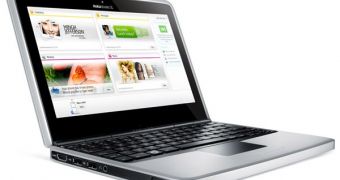As some of you probably remember, Nokia, the world's leading vendor of mobile phones, has made its debut into the market for low-power, low-cost, portable computer systems with the introduction of its first netbook system, the Booklet 3G. Announced over one week ago, the Intel Atom-based system has been kept under wraps for a while, up until this moment, when Nokia announced more details on the device, at the Nokia World 2009 event, which has kicked off today with a keynote on some of the company's latest products.
The Finish company has announced that its first portable computer system and also the first device it manufacturers on a x86 architecture, the Booklet 3G, will be available for €575 ($816), pre-subsidies, a price tag that comes close to previous rumors that indicated the netbook to be coming out with a price point of US$799, pre-subsidies. However, the company expects that the price of the Booklet 3G will come down, once network carriers start subsidizing the ultraportable, which comes with a 3GB connectivity solution as a standard feature.
In related news, the fellows over at Slashgear have been lucky enough to get their hands on one of the pre-production units and have posted pictures and first impressions on the new device. According to them, Nokia managed to provide the Booklet 3G with one of the most impressive keyboards on any netbook-sized device they had previously taken a look at. However, the slow Intel Atom Z530 1.6GHz processor appears to be keeping the netbook from providing a smooth Windows 7 operating environment, but it is too early to conclude anything, given that they are dealing with a pre-production sample.
The Booklet 3G is one of the most fully featured netbooks on the market, providing users with a stylish exterior design and a quiet and ultraportable computing experience. It will be interesting to see if the Nokia brand and the subsidized policies will allow the company to gain more market share from some of its competitors, like ASUS or Acer.

 14 DAY TRIAL //
14 DAY TRIAL //